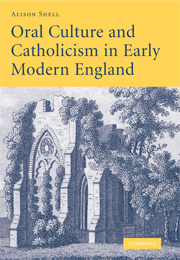Book contents
- Frontmatter
- Contents
- List of illustrations
- Preface
- Note on conventions
- List of abbreviations
- Introduction
- 1 Abbey ruins, sacrilege narratives and the Gothic imagination
- 2 Anti-popery and the supernatural
- 3 Answering back: orality and controversy
- 4 Martyrs and confessors in oral culture
- Conclusion: orality, tradition and truth
- Notes
- Index
4 - Martyrs and confessors in oral culture
Published online by Cambridge University Press: 22 September 2009
- Frontmatter
- Contents
- List of illustrations
- Preface
- Note on conventions
- List of abbreviations
- Introduction
- 1 Abbey ruins, sacrilege narratives and the Gothic imagination
- 2 Anti-popery and the supernatural
- 3 Answering back: orality and controversy
- 4 Martyrs and confessors in oral culture
- Conclusion: orality, tradition and truth
- Notes
- Index
Summary
To acclaim martyrs is to align oneself with them and their cause. To do so publicly near the time and place of their death is something confessors do, since the notion of confessorship associates proclamation of one's faith with the willingness to remain steadfast in it, risking danger and sacrifice. The Catholic martyr-ballads of late Tudor and Stuart England, with their associated oral culture, yield intimate links between the representation of martyrs and the practice of confessorship: not surprisingly, given the immediacy of oral declaration and its inseparability from public religious and ethical commitment. The practice of making public or semi-public oral statements about Catholic martyrs could have had a threefold effect: commemorating the individuals in question; committing the speaker to follow their example till death; and stimulating zeal in like-minded hearers and viewers. Thus, preservation of a martyr's memory could inspire exemplary behaviour in the public arena – which makes it ironic that the legacy of martyr scholarship has been such an ethically mixed one.
Over the centuries, remembering martyrs of one's own camp has sometimes involved denouncing those of rival beliefs, but more often ignoring them; many Christian denominations have had good reason to forget about those who died exemplary deaths at their hands. Within the academy, at least among post-medievalists, hagiography has usually been seen as the business of denominational scholars – or even, at times, as what mainstream historians are there to prevent.
- Type
- Chapter
- Information
- Oral Culture and Catholicism in Early Modern England , pp. 114 - 148Publisher: Cambridge University PressPrint publication year: 2007



